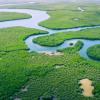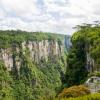
Without the implementation of nature-based solutions through actions such as halting deforestation and promoting large-scale native vegetation restoration, Brazil would jeopardize its Nationally Determined Contribution (NDC) pledges including achieving net zero GHG emissions by 2050, according to a new study. The researchers also emphasize that stopping deforestation is the most important mitigation measure Brazil can take towards net zero while preventing biodiversity loss.
The research team projected Brazil's greenhouse gas (GHG) emissions up to 2050 under different national policy scenarios through a regional integrated modeling approach. This compared the potential emissions reductions resulting from nature-based solutions (including large-scale restoration) against engineered solutions, such as bioenergy with carbon capture and storage (BECCS), besides their relative economic costs.
The study, published in Global Change Biology, indicated that nature-based solutions could mitigate nearly 80% of Brazil's net zero pledge and reduce 781 million tons of CO2 on average per year in Brazil during the next 30 years. Eliminating both legal and illegal deforestation and promoting large-scale restoration have the potential to keep Brazil on a clear path to net zero GHG emissions by around 2040 without the need to deploy costly and not-yet mature negative emissions technologies.
“Deforestation control and native vegetation restoration are ready to be implemented immediately at relatively low cost when compared to engineered solutions such as BECCS. This gives Brazil a comparative advantage over other countries. It is also a multiple win situation because the careful implementation of nature-based solutions helps mitigate and adapt to climate change, curb biodiversity loss, and support the economy,” explains Aline Soterroni, lead author of the study, a guest researcher in the Integrated Biosphere Futures Research Group of the IIASA Biodiversity and Natural Resources Program, and a research fellow at the Biology Department of the University of Oxford.
Achieving this, however, would require national policies that go further than the current Forest Code for Brazil, a law requiring landowners to maintain 20-80% of their property under native vegetation and to restore illegally deforested native vegetation. The researchers found that implementing Brazil’s Forest Code without additional actions would bridge the gap to GHG emissions by 38% by 2050, falling far short of the net zero target.
“While the implementation of the Forest Code is urgent and can enable Brazil to achieve and increase its short-term climate ambition, it won’t be enough to bridge the gap to net zero emissions by 2050. A net-zero pathway for Brazil that goes beyond the Forest Code, eliminating both illegal and legal deforestation and enhancing large-scale native vegetation restoration targets would be 44% less costly, with the added benefits of adaptation to climate change impacts promoted by nature-based solutions,” adds Soterroni.
Ahead of the COP28 summit, the researchers are calling for nature-based solutions to be holistically represented in national climate pledges, including Brazil’s.
“Although in policy documents such as the NDC, net zero is not yet included in Brazilian legislation. In the latest NDC revision submitted to the United Nations Framework Convention on Climate Change (UNFCCC) and officially available on 1 November 2023, Brazil also did not present a net zero plan. While achieving net zero grounded in nature-based solutions is critical for the climate and biodiversity agendas in Brazil, the pathway to achieving it is equally important. Our findings demonstrate that relying solely on the energy sector to bridge the gap to net zero is not feasible,” notes Michael Obersteiner, study coauthor and principal research scholar in the Exploratory Modeling of Human-natural Systems Research Group of the IIASA Advancing Systems Analysis Program.
“Brazil harbors around 20% of the world’s species, so ongoing ecosystem conversion threatens the integrity of the entire biosphere. It is of utmost importance to support Brazil in its efforts to strengthen, apply, and go beyond existing laws to implement nature-based solutions, particularly eliminating both illegal and legal deforestation and promoting large-scale native vegetation restoration,” adds Nathalie Seddon, professor of Biodiversity and founding director of the Nature-based Solutions and Agile Initiatives at the University of Oxford.
The research team highlight that despite the growing popularity of the term “net zero” in the policy discourse, there is a lack of regional modeling approaches to determine the extent to which they can help nations to design their credible net zero pathways, especially in the Global South. Global integrated assessment models are typically not capturing country-specific nuances, including important aspects of national policies. Global integrated assessment models also rely heavily on afforestation and not-mature-yet technologies such as BECCS to bridge the gap to net zero globally without considering its negative socio-ecological impacts. This study directly addresses this knowledge gap by advancing systems analysis through coupling a regionally refined global land use model with a regional energy system model and aiming to deploy more efficient ways of infusing systems science into policy for more sustainable development.
Adapted from a press release by the University of Oxford. Read the original text here.
Reference:
Soterroni, A., Império, M., Scarabello, M., Seddon, N., Obersteiner, M., Rochedo, R., Schaeffer, R., Andrade, P., Ramos, F., Azevedo, T., Ometto, J., Havlik, P., Alencar, A. (2023) Nature-based solutions are critical for putting Brazil on track towards net-zero emissions by 2050 Global Change Biology DOI: 10.1111/gcb.16984
News

29 November 2023
Embracing ecological perspectives, tools, and models to navigate the digital economy

27 March 2023
Co-producing fair transformative pathways towards climate and biodiversity goals

05 August 2022


